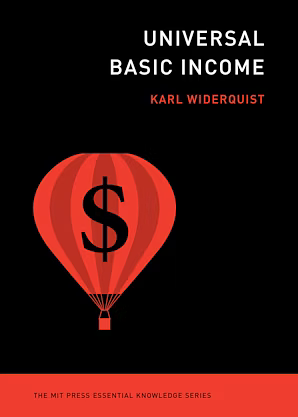
Universal Basic Income
by Karl Widerquist
Genres: Non-fictionPages: 272
Series: The MIT Press Essential Knowledge Series
Rating:

Synopsis:An accessible introduction to the simple (yet radical) premise that a small cash income, sufficient for basic needs, ought to be provided regularly and unconditionally to every citizen.
The growing movement for universal basic income (UBI) has been gaining attention from politics and the media with the audacious idea of a regular, unconditional cash grant for everyone as a right of citizenship. This volume in the Essential Knowledge series presents the first short, solid UBI introduction that is neither academic nor polemic. It takes a position in favor of UBI, but its primary goal remains the provision of essential knowledge by answering the fundamental questions about it: What is UBI? How does it work? What are the arguments for and against it? What is the evidence?
Karl Widerquist discusses how UBI functions, showing how it differs from other redistributional approaches. He summarizes the common arguments for and against UBI and presents the reasons for believing it is a tremendously important reform. The book briefly discusses the likely cost of UBI; options for paying for it; the existing evidence on the probable effects of UBI; and the history of UBI from its inception more than two hundred years ago through the two waves of support it received in the twentieth century to the third and largest wave of support it is experiencing now. Now more than ever, conditions in much of the world are ripe for such enthusiasm to keep growing, and there are good reasons to believe that this current wave of support will eventually lead to the adoption of UBI in several countries around the world—making this volume an especially timely and necessary read.
Universal Basic Income is part of a series from the MIT press, the “Essential Knowledge Series”, and this installment is by Karl Widerquist. The point of it is to act as a primer on the subject of Universal Basic Income (UBI), and be a bit of an advocate for it, based on what we know about similar programmes and test cases.
The evidence is (or was at the time of posting) not totally straightforward, because the true test of a UBI would be universality and unconditionality, and most trials have not been universal even within a small area, and may have contained conditions. Widerquist makes a good argument that the results we see are indicative of success, though, and that some aspects of the effects of a UBI might be underreported in such a small study (while acknowledging that some are probably overreported).
There are quite a few acronyms flying around which I didn’t always find easy to remember, but mostly it’s a fairly straightforward explanation and manifesto. However, there were a few editing booboos, including an entire paragraph being repeated verbatim in a list, which was a bit annoying.
Rating: 3/5
